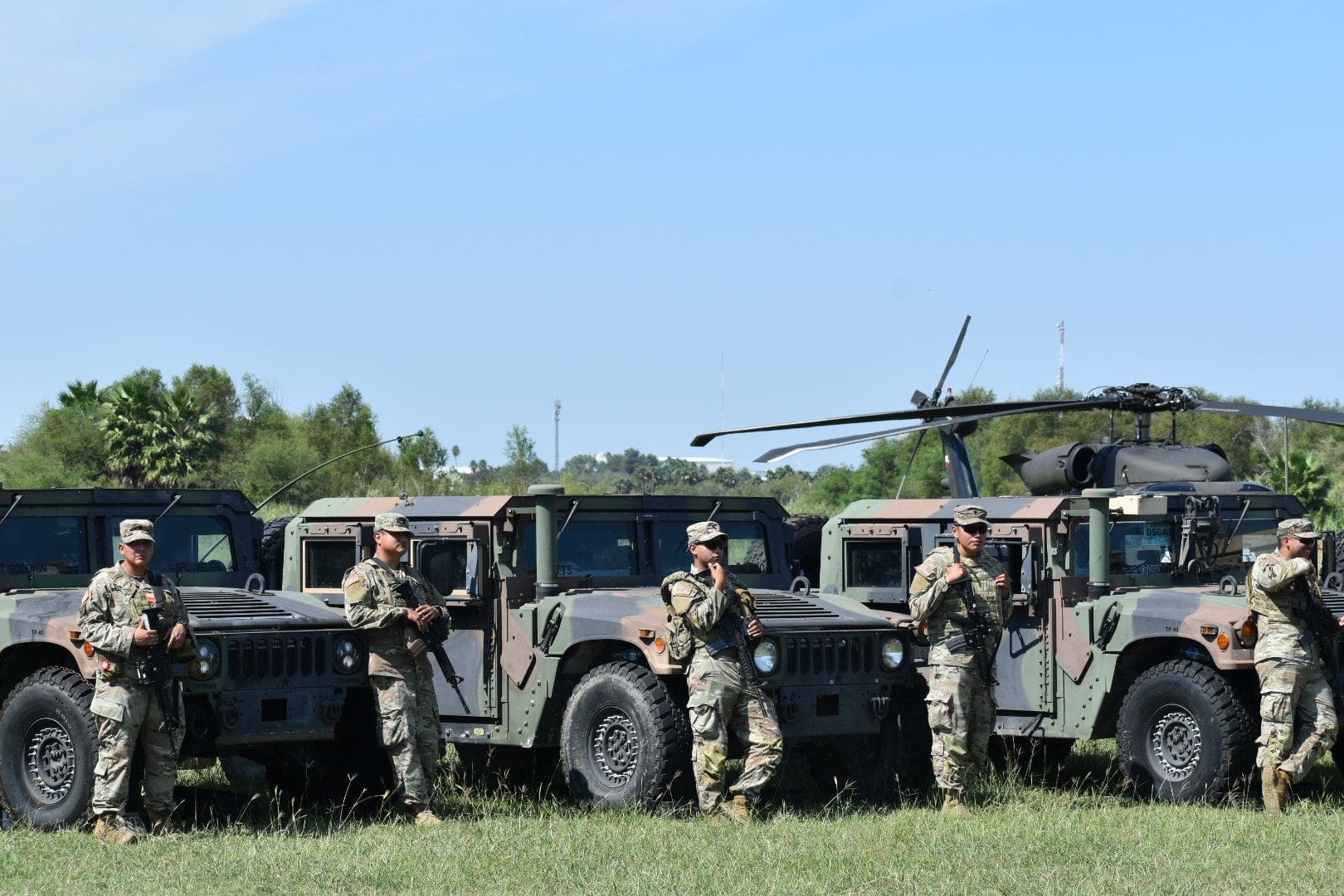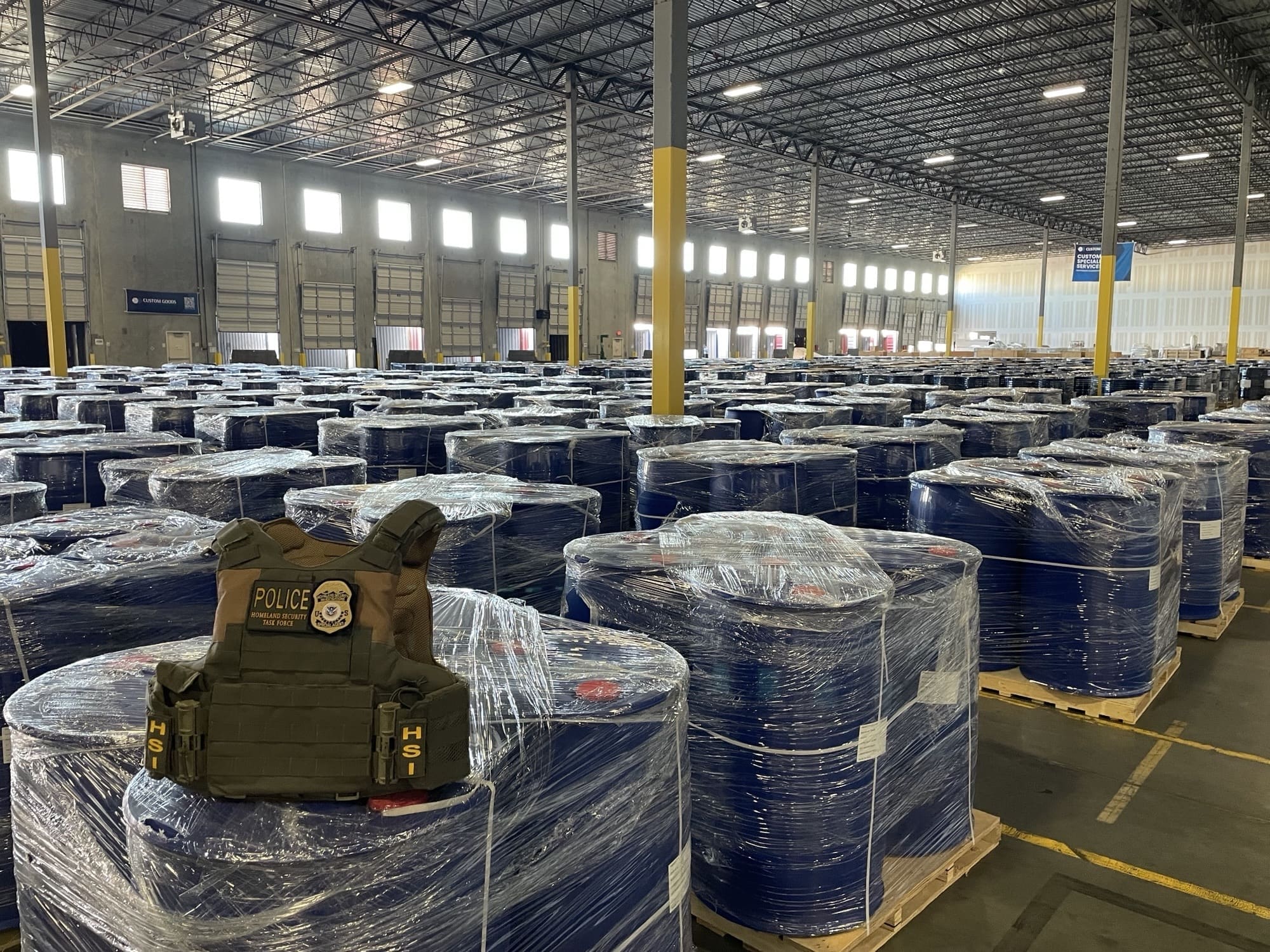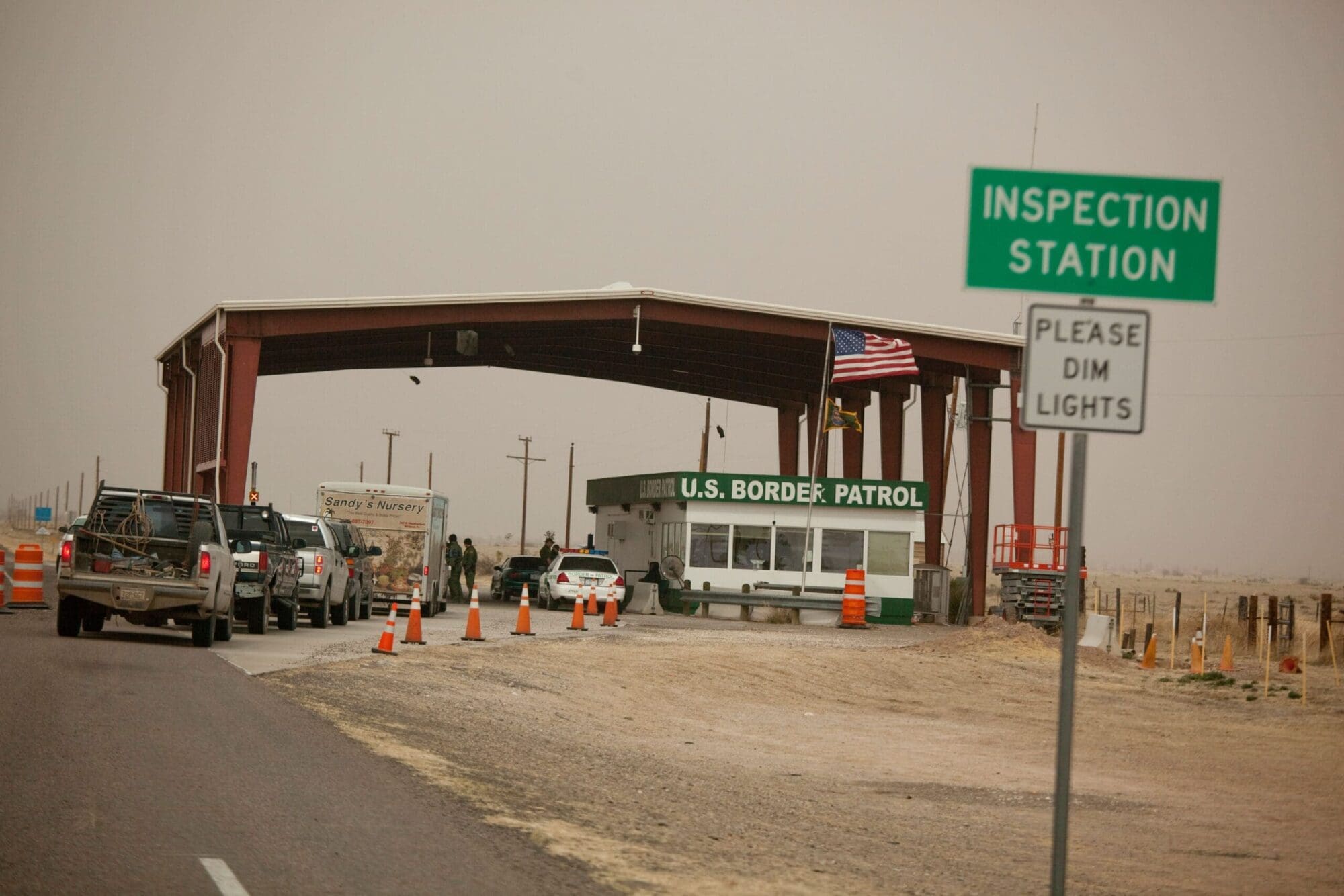Texas soldiers are unnecessarily entangled in a train wreck of layered bureaucracies, political issues, staff turnover, and IT headaches. Issues in paying troops, identified last year, persist.
As we previously reported, Operation Lone Star (OLS) is part of Gov. Greg Abbott’s pivot to border security following the Biden–Harris Administration’s abdication of strong border security measures. Essentially, OLS surged members of the Texas National Guard (TNG) and the Texas Dept. of Public Safety to the state’s southern border.
Unfortunately, as Texas Scorecard reported in December, an unknown number of TNG troops involved in OLS were being paid late.
A whistleblower’s allegations of “rampant pay issues” first made to Texas Scorecard in October, were confirmed by communications obtained through a Public Information Act request. The issues were severe enough for Maj. Gen. Tracy Norris, Adjutant General of the Texas National Guard, to directly ask Texas Comptroller Glenn Hegar for help on October 18.
“They even called Kim to make sure I got the letter through her as well so we may need to give them a call so they [can] take [a] deep breath,” Hegar emailed Rob Coleman, director of the Comptroller’s Fiscal Management Division.
For its part, the Governor’s office has been on notice since October. Our first article in this series focused on problems, while this article examines process, including how Texas soldiers are paid when assigned to missions like OLS.
However, it appears even those soldiers who are receiving paychecks are encountering issues.
Blackbox Payroll
Since the publication of our initial article, a whistleblower, different from the one who contacted us in October, recently disclosed issues for some soldiers who are being paid.
“Not one check has been the same,” said the source, who according to his military orders has been on OLS duty since October. “In the beginning my first check took a month and the next was 3 weeks, then another 3 weeks…Checks will go from 3100 to 2400 and no explanation given.”
The source said there are soldiers still receiving paper checks, and they must “continuously beg” to get pay stubs.
Last check was short 2 days and now they tell us they just moved the pay cycle around, so we aren’t actually short, but nobody truly knows if that is the truth or not, because we don’t get pay stubs… I have been here since October and I have received 2 pay stubs…And even then the paystubs just show taxes. They [don’t] tell you how much pay is from base pay and how much is from allowances received, so you can’t tell what [your] pay should be or if it is short.
How Soldiers Get Paid
The process by which Texas soldiers are paid when on operations like OLS is complex.
According to internal comptroller communications, Unit Personnel Officers must report daily to the federal government who showed up for duty. They do this by recording each soldier’s status in the Personnel Emergency Management System (PEMS). This is TMD’s attendance recording system. After the federal government validates the information in PEMS, TMD is told who will be paid and how much. TMD provides that information to the Texas Comptroller, and payment information is uploaded into the Centralized Accounting Payroll Personnel System (CAPPS) so the comptroller can cut soldiers’ paychecks.
The Texas Comptroller’s website states CAPPS “is the official name of the statewide Enterprise Resource Planning system” and that it “provides a single financials and human resources payroll administration software solution for Texas state agencies.”
Texas Scorecard asked the comptroller to confirm if our understanding of how the payment process works is accurate. “We are unable to give any details on how attendance information is collected by TMD, as none of those functions are done using CPA systems,” Kevin Lyons, spokesperson for the comptroller, replied. “We can confirm that TMD uploads a mass spreadsheet into CAPPS, and that information is used to generate payments, either direct deposit or warrant.”
Internal comptroller communications shows that normally TMD, like many professions, has bi-monthly payrolls for OLS. One on the 15th, and one at the end of the month.
In her letter to Hegar, Norris explained assignments like OLS are considered long-term State Active Duty (SAD). When TNG and Texas State Guard service members are on SAD, they’re considered “temporary state employees” and “their pay is processed through the state payroll process as supplemental payrolls.”
She further explained that “under normal circumstances, this involves processes unique to TMD to process payrolls” in CAPPS.
Attendance and Direct Deposit Issues
That same day, Coleman informed comptroller staff by email he had spoken with Shelia Taylor, Director of State Administration at TMD. “She mentioned the manual processes needed to add individuals into CAPPS. I thought this was already an automated process. Are we working with them on this?”
Alice Alvarado, Manager of the comptroller’s Statewide Fiscal Systems Department, explained to Coleman the difference between federal and state duty for Texas soldiers. “National Guardsmen are used to being paid for the time they are on Federal Orders, almost immediately. This can happen because the Federal Pay Office knows exactly when a guardsman is on Federal Orders and for how long, since attendance is mandatory,” she wrote.
State Active Duty is not mandatory in the same way Federal Duty is for them; therefore, the federal Personnel Office (who handles State Active Duty mission management) must get daily attendance information from the Unit Personnel Officers in order to validate duty days and payments. This requires manual attendance entry into the PEMS system.
Alvarado wrote PEMS can generate “the mass hire file for CAPPS; however, this functionality may not be working as originally designed, which is resulting in the need for manual hires/updates.” When the “Federal Pay Office” makes the cutoff date for payroll, FPO must certify attendance in PEMS before giving TMD’s State Payroll Office payment information. Then a “mass load spreadsheet” can be made, taken from PEMS and given to the Comptroller.

Texas Scorecard asked the comptroller if PEMS is a state or federal system. “CPA does not have any affiliation with the Personnel Emergency Management System, thus we do not know if it is federal or state, when it was created, or its operational status,” Lyons replied.
Alvarado also described the difficulty of direct deposits for Texas Soldiers in OLS. “There is no mechanism for pulling EFT data for only those SAD Service Members currently on duty. The federal Personnel Office has to request a file from the Federal Pay Office and provide it to the TMD Payroll Office,” she wrote. “The TMD Payroll Office then has to format the file and provide it to CPA to load.”
CPA is another name for the Texas Comptroller.
Texas Scorecard asked the comptroller if our understanding of the facts on direct deposit is accurate. “CPA does not have visibility into TMD’s process for obtaining direct deposit information, thus we cannot confirm the process as described,” Lyons replied. “TMD has provided bulk direct deposit information to be loaded into CAPPS in the past, and more recently they have been manually entering this information into CAPPS themselves.”
We also asked the comptroller what Federal agency or agencies the Federal Pay Office and Federal Personnel Office reside in. “CPA does not interact with any other federal or state office regarding TMD or its payments,” Lyons replied. “We only communicate with TMD. As such, we are unfamiliar with those offices and under what jurisdiction they belong.”
Because the Biden–Harris Administration has refused to stop illegal border crossings, this complex system was put to the test through Operation Lone Star. It fell apart.
Manual Errors
In an October 22 email to Coleman, Alvarado reported that since September 1, several errors were made by TMD staff manually entering more than 860 SAD soldiers into CAPPS. Comptroller staff also had to get outside help to correct an error that affected all CAPPS agencies trying to “enter new hires.”

“Because such mass manual entry can result in these issues, we are highly recommending to TMD to provide a mass hire file to load into CAPPS,” she wrote. “When Danette last spoke with TMD staff, they were preparing a mass new hire file that contains 17,000 new hires and hope to have that file to CPA by the end of the day today, 10/22/21.”
More errors arose that interfered with Texas soldiers getting paid at a time while more were being added to the ranks by Gov. Abbott. In an October 21 email, Clarisse Roquemore, a director at the comptroller’s office, wrote:
We also need to be very aware that TMD’s problems are going to get worse, not better, in light of the border surge.
In an October email to comptroller staff, Hegar wrote his understanding was Abbott’s office “wants to increase deployment from 5,000 personnel to 10,000.” On November 22, it was announced Abbott had deployed 10,000 TNG and state troopers to the border.
Server Down
Alvarado updated Coleman on October 24 that, as of 4:00 p.m. Friday, no files from TMD had been received, nor had they made any updates. “TMD reported to Danette via text late Friday, that their SFTP server was down and they would send the file as soon as possible.”
“The world is against us,” Alvarado wrote Coleman the next day. “It appears the EFT server managed by IT has been down since possibly Friday. It appears that it was CPA’s server – not TMD’s server that prevented the file transmission.”

Alvarado said the comptroller’s IT staff were working to fix the problem, and by 9:55 that morning reported “EFT is resolved.”
Danette McWilliams, who used to work for TMD but now works for the comptroller, later informed Alvarado that “We have confirmed with CAPPS IT that the server is up and we have the ability to receive the file once it is sent.”
Lyons confirmed to Texas Scorecard CAPPS IT is “part of the Comptroller’s office.”
Alvarado emailed another update hours later that the server TMD was using wasn’t “whitelisted” with the comptroller, TMD didn’t know “what account to use,” and comptroller staff had to give TMD the key for the right directory. “TMD incorrectly placed the file in the wrong directory[;] they were using the “Out” folder instead of the “In” folder.”
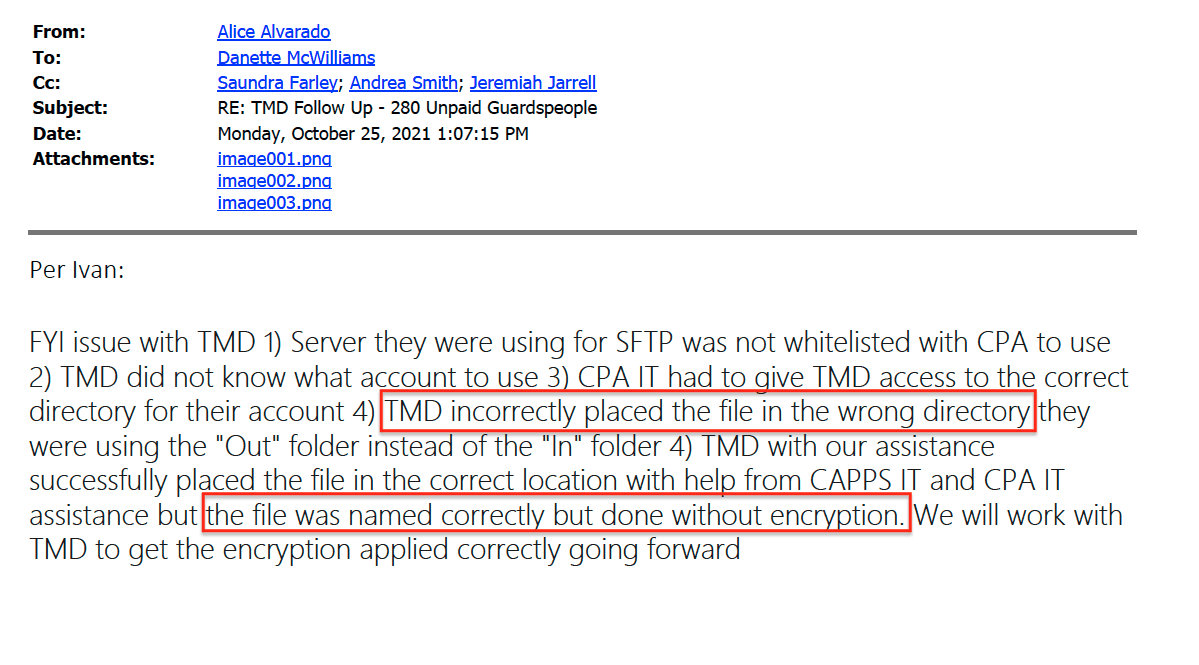
Texas Scorecard asked the comptroller about the server issue. “TMD’s server not being whitelisted prevented them from being able to transfer the file to our server. This issue only involved the loading of new hires, not direct deposits,” Lyons replied. “The issue was resolved and we have not had a similar issue since. There were 2 issues, neither of which were on the CPA side. TMD was not placing the file in the correct location, which was preventing the file load. Second was the whitelisting issue.”
Alvarado also noted a security concern. “TMD with our assistance successfully placed the file in the correct location with help from CAPPS IT and CPA IT assistance[,] but the file was named correctly but done without encryption,” she wrote. “We will work with TMD to get the encryption applied correctly going forward.”
Texas Scorecard asked the comptroller about this security issue. “We have not seen a persistent issue regarding TMD uploading unencrypted files. This was the only file that has been uploaded unencrypted, which was subsequently deleted,” Lyons replied. “The file transfer and storage of files to the CPA file server are secured.”
TMD Turnover and Inexperience
“Turnover is everywhere,” State Rep. Giovanni Capriglione (R–Southlake) replied to Comptroller Hegar in a text message exchange discussing TMD’s problems.
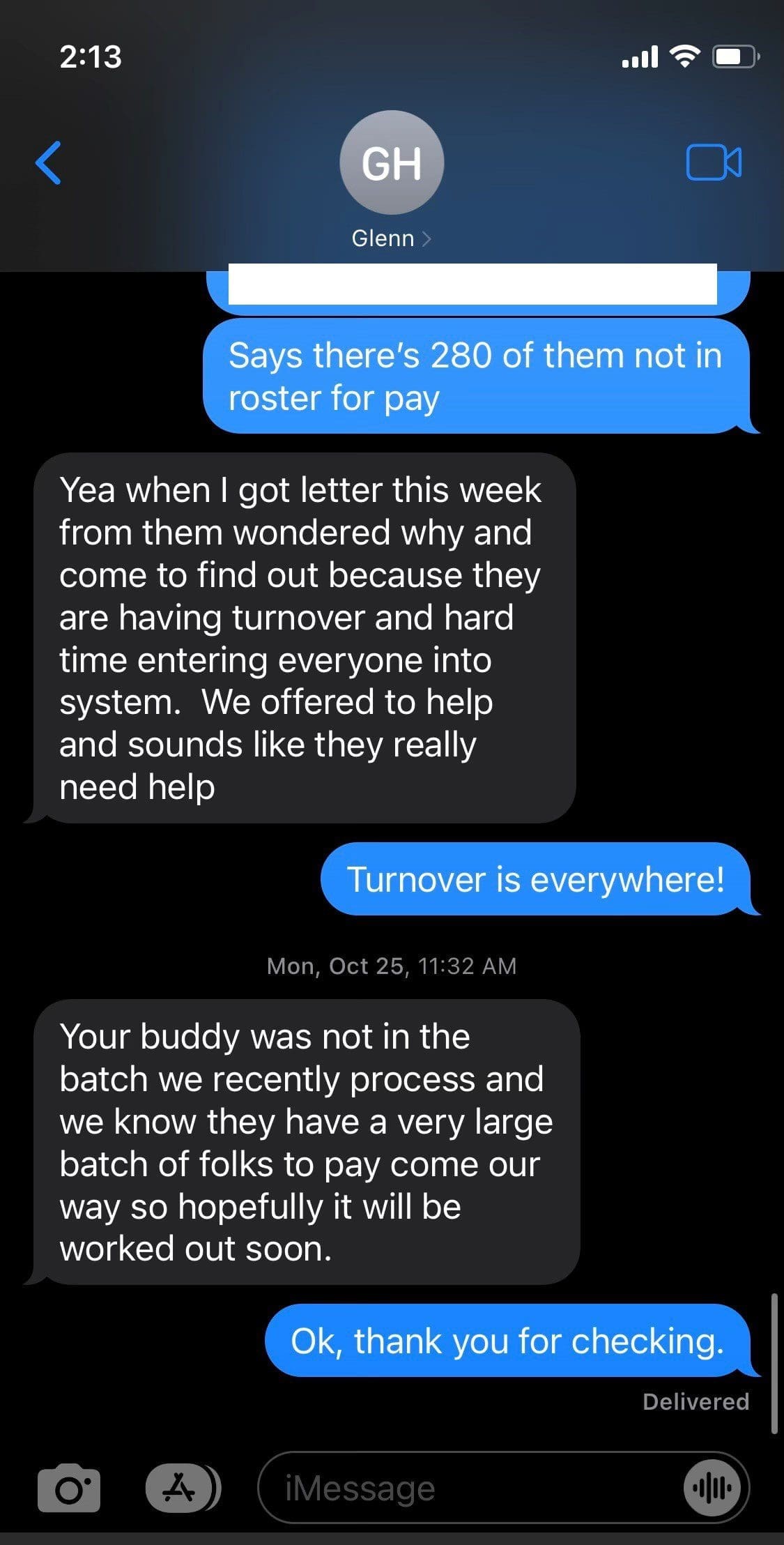
Texas Scorecard obtained this text message exchange through an open records request.
Not unlike other sectors in the economy right now, Coleman emailed Hegar on October 21 that TMD had a turnover problem. “According to staff, we are aware that the agency has experienced turnover in some senior staff, but we are prepared to assist as needed.”
“When I got [their] letter this week from them [I] wondered why[,] and come to find out because they are having turnover and [a] hard time entering everyone into [the] system,” Hegar texted Capriglione. “We offered to help and sound[s] like they really need [it].”
Alvarado discussed TMD’s turnover problem with Coleman October 21. “We are also aware of high turnover at TMD,” she wrote. “As such, Production will be treating them much like we do the legislative agencies – and consider every request “high” to ensure things are handled quickly and appropriately.”
Duvan Arsola, Appropriations Control Officer of the Comptroller’s Fiscal Integrity Division, provided more details in an October 21 email.
[The] agency had their two most experience[d] budget analysts leave in the spring, leaving the agency was 2 budget analysts with less than a year of experience. Additionally these unexperienced budget analysts have not taken either USAS Core or Appropriation Management trainings.
Arsola also mentioned TMD brought on a new Budget Manager last spring, who left the week before his email. To fill the gap, TMD made their purchasing manager their interim Budget Manager.

Arsola wrote these inexperienced staff members “have been good at asking questions, receiving feedback and learning from that feedback,” and that “essentially they are trying but there is a lot to learn.”
“The two remaining budget analysts at TMD had less than a year of experience,” Lyons told Texas Scorecard in response to a request for clarification.
Yet failures persisted. “TMD and their turnover is causing more complications,” Alvarado wrote Coleman on October 25. “They have twice now – processed the SPRS outbound twice. When that happens, the second submission negates the first. So basically, they stop the processing.”
They apparently did this last Thursday and our staff met with them and explained. And then they did it again Friday.
As comptroller communications reveal, TMD’s problems weren’t only affecting soldiers’ paychecks.
Funding for Soldier Benefits
When Coleman asked comptroller staff about Norris’ letter, Roquemore replied on October 21. “This relates to a conversation I had with Colonel Finley (over the Tx State Guard) last week,” she wrote. “I spoke with Duvan, and he notes that TMD had not pulled down AY21 benefits or moved certain revenues forward to support troop salaries. Duvan has indicate[d] there are a lot of problems within the agency’s finance department, and the colonel conceded that he was more or less aware of that.”

On September 13, 2021, Dawna Rocks, Budget Manager at TMD, emailed Arsola. “We know we have the funding for SAD (11101 PCA) but do not seem to have the funding for benefits,” Rocks wrote. “Have the funds already been swept? And how do we get them back? We are not sure if these are the only errors, but we know they are some of the issues. We are needing the monies shown for 91142 and 99327.”
“I just need a document to draw GR benefits into the Benefit Appropriations for the amounts needed into AY21 [appropriation year],” Arsola replied. “But these draws will be current dated and recorded in FY22 [Fiscal Year].”
Texas Scorecard asked the comptroller about these terms. “AY is the year in which budget is authorized. FY is the financial reporting period. A budget authorized is typically effective for that FY plus two fiscal years (FYs),” Lyons replied. “For example, a standard appropriation authorized in AY 22 can be expended between 9/1/21-8/31/24 (FY22, FY23, and FY24), so long as the agency obligates any future expenditures by 8/31/22 (the end of FY22).”
Arsola emailed Rocks the benefits for these TNG soldiers “will be an AY21 FY22 draw,” and forwarded Rock to the Comptroller’s website for more details.
Stonewalling
“As of today, all service members are receiving paychecks, as well as detailed pay stubs,” TMD told Texas Scorecard January 7. This statement contradicts what we have been told.
TMD suggests missions of this magnitude “have administrative challenges,” and further that “onboarding thousands of Guardsmen into a state payroll system is always a hurdle for any National Guard state active duty mission.”
In an interview with Texas Scorecard, retired Sgt. Maj. Jason Featherston, former Senior Enlisted Advisor to TMD, said TMD has successfully done large increases in staffing in the past, pointing to when TNG was activated for relief efforts following Hurricane Harvey. “Have we put this many people on orders before at one time? Absolutely. Has it been this long? I would say no,” he said. “Operation Lone Star was … [poorly] planned. If I know that I got to bring on 10,000 people…I’m going to bring on people that know how to pay 10,000 people, that can input pay, and can order equipment, and make sure that processing is done in a way to where soldiers are not going to face the hardships that they face now.”
And the hardships appear to be ongoing. A source within TNG told Texas Scorecard on January 10 there are still Texas Soldiers not being paid on time. “We still have soldiers missing paychecks from October.”
“I’m suspecting that J1 will either make 17 day pay cycles to catch up, or we will be paid at the very end of the mission for the days we are missing,” this source said January 6. “The screw ups come from OSA [Office of State Administration] in the actual sending of the checks and direct deposits, and the J1 makes it worse by switching up the pay cycles.”
Abbott’s office has not responded to our press inquiry about if the situation is resolved and soldiers are now being paid on time. On January 11 he claimed “all paycheck issues have been addressed.”
Last weekend, an email surfaced from Maj. Gen. Norris urging soldiers not to talk to the press.
If you or someone you know are experiencing pay issues or other problems while serving on Operation Lone Star, please contact us at rmontoya@texasscorecard.com
